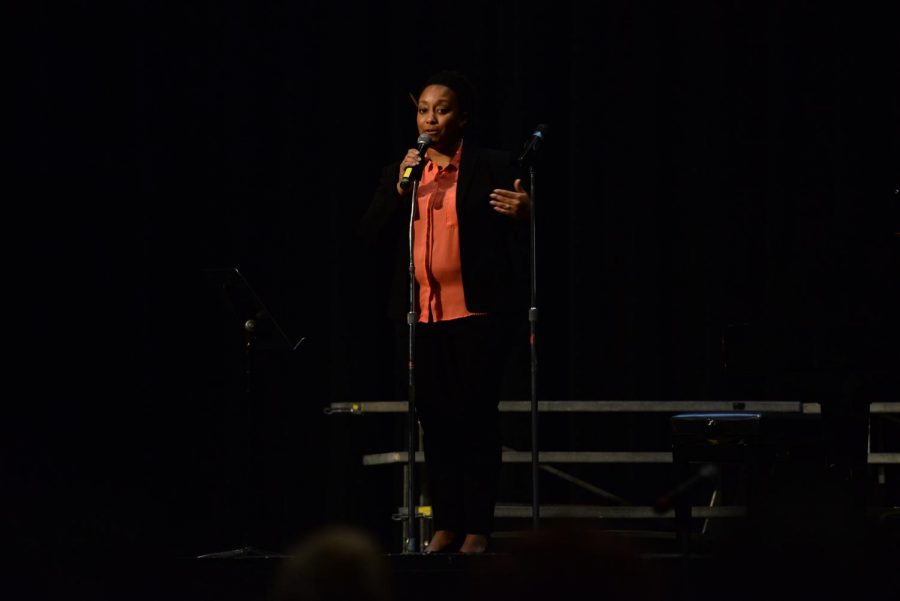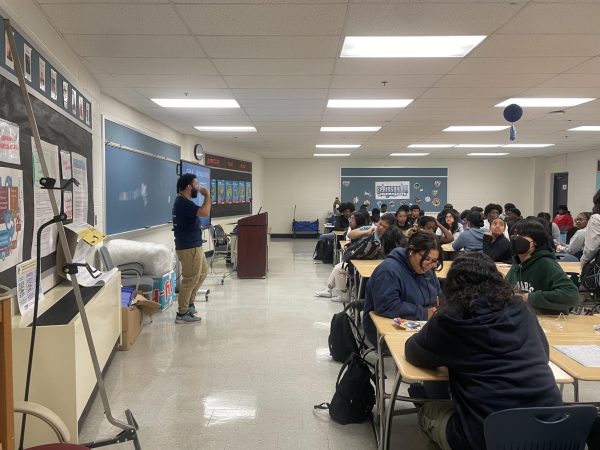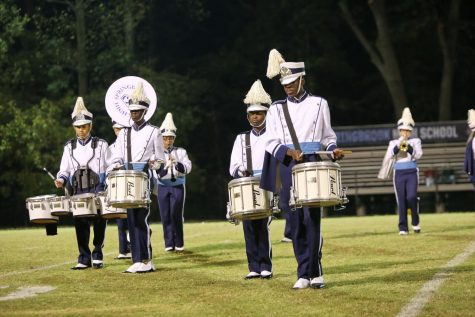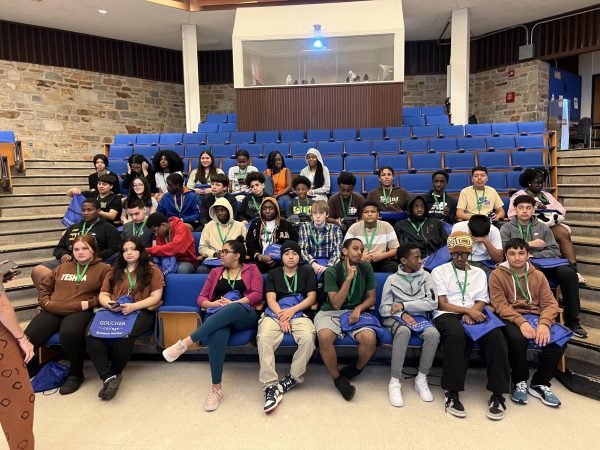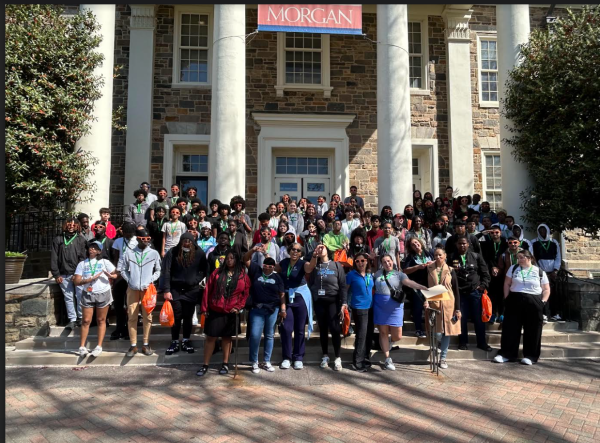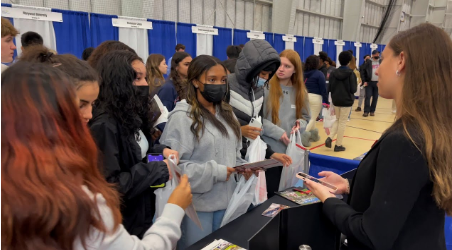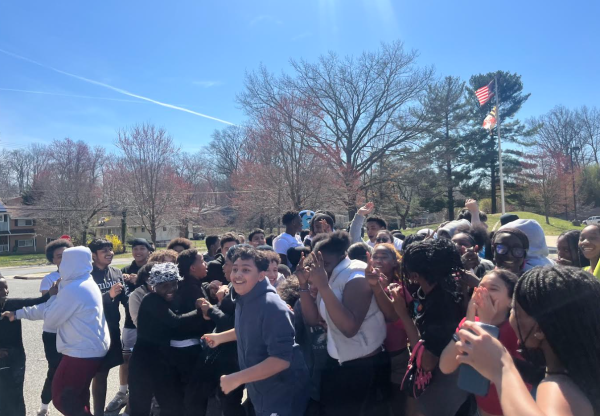Fight over Springbrook teacher’s employment reveals deeper county issues
photo by Trident Staff
Ms. Hairston speaks at last year’s winter concert.
The fate of Amy Hairston, one of Springbrook High School’s two music teachers, captured the soul of the Springbrook music community. Parents and students fought for Hairston to be reinstated as a full-time instructor, instead of being relegated to a part-time instructor, wherein she would have had to teach at two schools. Had the plan gone through, it would have also reduced the school’s two current choir classes to one and eliminated AP Music Theory due to low enrollment.
Isabel Valle, a sophomore at Springbrook, told The Blueprint that the quality of music instruction would have gone down because Hairston would have had less time to plan her lessons. Beyond that, there would have been minor but not unimportant changes across the school, according to Hairston. She said that she is involved with many activities such as sing-a-grams within Springbrook — she said that she was not sure who would or could take over those roles.
Ultimately, the students and parents had their way, but not without a fight. Isabel started a Change.org petition that was circulated through social media, hoping to keep Hairston in her full-time position. She told The Blueprint about the day she learned of the decision to cut Hairston’s hours:
“We were just cleaning the room, talking, not really doing anything in particular. And then someone in the class sat down and said, ‘I’m not supposed to tell you this, but Springbrook is trying to get rid of Mrs. Hairston’. He started to tell us a list of people we should talk to and how we should take action. He was really just telling us, ‘Hey, you guys have the power to change what’s happening’.”
Isabel continued, “I remember that there was a lot of crying. A lot of letters were written. It was a really long day. Someone had called a meeting in the auditorium talk about it. The adults in drama club had found out so they said to meet in the choir room, and Ms. Hairston was there. She explained what was happening to all of drama club and they passed around a petition.”
Hairston, who is in her third year teaching at Springbrook, recalls that the meeting in which she received the news was difficult for her. She was most worried about the fate of the musical and the choir adjudication, which was taking place the next day. “My mind immediately went to, ‘Oh my gosh, if I have to do extra things that you have to do if you’re an involuntary transfer — How am I still going to be able to do my normal school stuff?’”
Isabel said that she understood and accepted that there was low enrollment in Hairston’s classes, but pointed out that counselors sometimes discourage students from taking music classes “because it doesn’t fit in their schedule or because it’s not in their best interest.” It happened to her, too. According to Isabel, before her freshman year, her counselor suggested that she take choir off her schedule because she didn’t need the credit, but Isabel refused. Some have suggested that this is a possible explanation for the falling enrollment.
According to Isabel, the online petition had a significant impact on Dr. Williams, the principal of Springbrook High School. She said that she met with Williams before the petition started to gain traction and he told her that the issue “only affected a small number of students,” but he was nonetheless concerned about it.
“I think when we hit around 480 [signatures], he started to realize that it was a bigger problem and that it wasn’t the best for the students to have Ms. Hairston part time.”
Williams declined The Blueprint’s request for an interview, saying that he is not at liberty to discuss personnel matters. He sent a statement saying that he appreciates “Ms. Hairston’s contribution to the Springbrook community and look forward to an exciting school year next year and my continued work with her.”
According to Mrs. Hairston, the Montgomery County Board of Education took the issue up because of parent and student testimony at the April 22 and 29 meetings, as well as the petition.
She said she felt “humbled” by the testimonies in front of the Board of Education: “I think a lot of teachers give their all, but they don’t always know for sure how it’s going. Teachers hit moments where they feel defeated — I’ve had those tough days like that. Seeing the testimonies and the different things that students were saying, for me, personally, it was very meaningful.”
Students and parents advocated for Springbrook’s music program during the public comment portion of the Board of Education meetings on April 22 and 29. Isabel stated that the process of taking away under-enrolled music classes was “unfair to students” because students could not take the higher-level Advanced Placement and International Baccalaureate music classes and so would be assigned to level one classes. She further stated that music provides a “therapeutic outlet” that allows students to cope with to less stress buildup, anxiety, and depression. Losing Ms. Hairston would make that impossible .
Susan Rodgers, an outgoing senior at Springbrook, told The Blueprint that music became the highlight of her day due to Hairston, who she called “a pillar of strength.”
“She is always ready to support students with their life problems — whether or not they are in choir.” This sentiment was echoed by several other students and parents that testified.
By the April 29 meeting, it was decided that Hairston would continue to be employed full time. Maria Navarro, MCPS’ chief academic officer, announced the decision in response to an inquiry from Karla Silvestre, a member of the Board.
“Enrollment is lower, but we also acknowledge that this is a program. I’ve been concerned about piano classes, which are high, which would then warrant another point to allocation. At the same time, we need to look at the program as a whole. We worked with Mr. Williams [sic] at Springbrook and he will restore that 0.6 in order to make sure that there are two full time people.”
Shebra Evans, who serves as the Board’s president, did not respond to requests for an interview or comment.
Hairston sees her employment change as part of a larger problem in Montgomery County: “I don’t know if people were aware of kind of the trend that had started to happen with some of the cuts at the high school level — if you are not a magnet arts school, some of the arts programs are in danger of being cut down if staffing gets pulled from that school for whatever reason. The same thing happened at Rockville, and their teacher is back in a full-time position. Northwood is going through a similar situation in the Down County Consortium.”
In response to a question from board member Rebecca Smondrowski (District 2) about ways to increase promotion and awareness about music, Kimberly Statham, MCPS deputy superintendent, seemed to suggest that students were not taking the full picture into account: “I think it’s wonderful when students talk about how they really care about the teachers because of all the extra that they give to them. Unfortunately, we cannot staff solely around that, so that’s why we look at multiple measures in our decision making. But we do feel confident that for Springbrook with their current staffing, they can make this shift.” It is not clear what shift she was referring to.
MCPS does not base its funding for music programs on the percentage of students that are eligible for FARMS, the Free and Reduced Meal Service, unlike for other school programs. Springbrook recently held a fundraiser to raise money for its orchestra program. Derek Turner, a spokesman for MCPS, said that the school system does its best to fund everything.
“We have a finite amount of resources that we try to do our best to make sure that we’re giving everybody access to opportunity that they need. Unfortunately, we don’t have infinite amounts of money to do everything that we want to do.”
Hairston said that she would like to see the arts being supported “more consistently.” She pointed out that there at least three music teachers in each Howard County school, but acknowledged that “comparing counties can be like comparing apples and oranges,” especially because Montgomery County has much more of a transient population.
Some students don’t think the administration does enough to promote the music program. One student told The Blueprint that they did not think that administration has the capacity to do more, suggesting that the morning announcements could also promote arts programs such as musicals and concerts more on the morning announcements, alongside congratulating sports teams for wins. Hairston pointed out that it is often easier to promote something that has wins and losses – especially if a team wins – than something that just exists, such as concerts.

